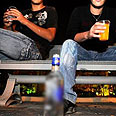
Drifting away from civility
Op-ed: Lack of discipline among young Israelis prompts our trademark aggression, rudeness
Young Israelis hold an immense level of aggression and are easily angered and intolerant; these traits often manifest themselves via violent behavior in response to minimal provocation, a tendency to speak loudly and yell, the usage of crude and provocative language, impatience for others’ views, impulsive reactions, and a surprising measure of indifference to others’ distress.
The violence, which has already become routine at entertainment venues catering for youngsters, the plethora of hit and run accidents, and the many cases of indifference shown to hurt individuals have all become so rampant that they no longer constitute news and the media barely reports them, with the exception of highly unusual stories.
This issue has been discussed so much that nothing new can be said about it. Nonetheless, there is no other way but to keep discussing it, in the hopes of prompting gradual change in public perception, so that it would no longer address crudeness and violence like a weather problem that cannot be changed.
The problematic nature of Israeli society had been the subject of endless intellectual analyses – ranging from our being a society in the process of being formulated and a melting pot of various cultures, through our tense lives and uncertain existence, and all the way to economic difficulties, over-crowdedness, the warm climate, and whatnot.
Math decline a warning sign
However, all of the above cannot explain the trends typical to the last decades that have emerged just as we’ve seen a growing standard of living and improved security situation, and in the wake of the great immigration waves, that have been followed by greater cohesion of language and culture. Yet now of all times we are seeing declining tolerance and politeness and a rise in violence and indifference.
In a previous article I wrote about violence I proposed, among other things, to revert to earlier times in respect to discipline at schools. For example, I suggested that students should again stand up when teachers enter the classroom and no longer refer to them by their first name, that they only speak when given permission to do so, and that they be expelled from school for a few days if all hope was lost.
My article, and a Knesset initiative to change the law regulating student rights, provoked a wave of extreme, aggressive responses. The intensity of the responses was commensurate with the freedom which children enjoy today, and with the uncompromising measure of protection they receive even when their behavior harms their surroundings and ultimately boomerangs, when they turn into the victims of their friends’ violence.
The loss of parental and school authority leaves our children and youths exposed, without any guidance, habits and customs that would enable them to cope with the demands of modern society in the civilized world – a world that does not tolerate violence or crudeness and that a long time ago has stopped seeing the charm that may have been inherent in the direct, crude approach two generations ago.
The drastic decline in the mathematics achievements of Israeli students is also a warning sign that should be taken note of. It does not stem from lack of talent or a teacher shortage, but rather, first and foremost, from lack of discipline at school and at home. There is no substitute for discipline when it comes to math and other core subjects.
Our medical schools, which take in the crème de la crème of Israeli students, are coping with flawed learning habits, lowly self-discipline, unrest during lectures, and unwillingness to engage in independent work. Universities have their own rules, and within a short period of time everyone toes the line, yet the starting point attests to the history of elementary and high school studies, which may teach academic material but fail to impart cultural values and study habits.
- Follow Ynetnews on Facebook










